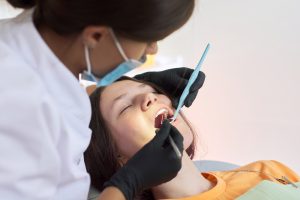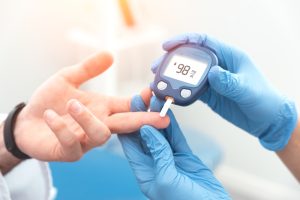Safe Sedation For Patients With Health Issues
For many patients in Sacramento, Rancho Cordova, Fair Oaks, and Citrus Heights who live with medical conditions, dental anxiety can be compounded by concerns about how their health status might affect their treatment options. Understanding how various medical conditions interact with different types of dental sedation is crucial for ensuring safe and effective dental care.
Dr. Scott Grivas, an experienced sedation dentist in Sacramento, CA, takes a careful, individualized approach to helping patients with medical conditions receive the dental care they need comfortably and safely. Learn more by reading the helpful guide below, or by calling our Sacramento dental practice at (916) 929-9222.
Understanding Dental Sedation Basics With Dr. Grivas
Dental sedation encompasses various methods to help patients feel relaxed and comfortable during dental procedures. The main types include nitrous oxide (laughing gas), oral conscious sedation, and IV sedation. Each option offers different levels of sedation and carries its considerations for patients with medical conditions. The key is matching the right sedation method to each patient’s specific health situation and dental needs.
Common Medical Conditions and Their Impact on Sedation Choices
Cardiovascular Conditions
Patients with heart conditions require special consideration when it comes to sedation dentistry. High blood pressure, heart disease, and previous cardiac events can all influence sedation options. For these patients, nitrous oxide often proves to be a safe choice as it has minimal effects on the cardiovascular system. However, careful monitoring is essential, and medication interactions must be considered.
For patients taking blood thinners, the timing of dental procedures and choice of sedation must be carefully coordinated with their primary care physician. IV sedation might require adjustment of regular medications, while nitrous oxide typically doesn’t interfere with most heart medications.
Respiratory Conditions
Asthma, COPD, and other respiratory conditions require careful selection of sedation methods. These patients may experience anxiety about breathing difficulties during dental procedures, making proper sedation crucial for their comfort. Nitrous oxide, when properly administered, can be safe for many respiratory patients as it’s delivered with oxygen and can help regulate breathing.
Oral conscious sedation might be appropriate for some respiratory patients, but careful screening and possibly consultation with their pulmonologist may be necessary. The level of sedation must be carefully controlled to avoid any respiratory depression.
Diabetes
Diabetic patients require special consideration due to their blood sugar levels and medication schedules. Morning appointments are often recommended when blood sugar levels are typically more stable. Nitrous oxide is generally safe for diabetic patients as it doesn’t affect blood sugar levels and wears off quickly.
For longer procedures requiring deeper sedation, careful coordination of medication timing and meal scheduling is essential. Blood sugar monitoring before, during, and after the procedure may be necessary with certain sedation methods.
Neurological Conditions
Patients with conditions like epilepsy or multiple sclerosis may require modified sedation approaches. The key consideration is how their condition and current medications might interact with various sedation methods. Some anti-seizure medications can affect how the body processes sedative drugs.
Nitrous oxide often proves to be a safe option for these patients as it’s quickly reversible and has minimal drug interactions. However, each case requires individual evaluation and possibly consultation with the patient’s neurologist.
Anxiety Disorders and Mental Health Conditions
Patients with anxiety disorders or other mental health conditions often require special consideration in sedation dentistry. Many of these patients take medications that can interact with sedatives. The choice of sedation method must account for both their psychological needs and potential drug interactions.
A combination approach might be recommended, using both behavioral techniques and appropriate sedation methods. The goal is to provide comfort while ensuring safety and avoiding adverse drug interactions.
The Evaluation Process in Sacramento, CA
Before recommending any sedation option, a thorough evaluation process is essential. This includes:
- Comprehensive review of medical history
- Current medication list analysis
- Consultation with primary care physicians when necessary
- Assessment of the planned dental procedure’s complexity
- Evaluation of the patient’s anxiety level
- Review of previous experiences with sedation
This thorough evaluation helps determine the safest and most effective sedation approach for each patient’s unique situation.
Safe Sedation Protocols With Dr. Grivas
Ensuring safe sedation for patients with medical conditions involves several key protocols:
Continuous monitoring of vital signs throughout the procedure, having emergency equipment readily available, maintaining current medical emergency training for all staff members, and following strict pre- and post-procedure protocols. These safety measures are especially crucial for patients with underlying medical conditions.
Post-Procedure Care
Recovery from sedation may vary depending on the patient’s medical condition and the type of sedation used. Specific post-procedure instructions are provided based on both the sedation method and the patient’s medical status. This might include modified recovery times, special monitoring requirements, or specific instructions about medication timing.
Making Informed Decisions
When considering sedation dentistry with a medical condition, it’s important to:
Work closely with both your dentist and primary care physician, provide complete and accurate medical information, ask questions about all available options, and understand both the benefits and risks of each sedation method. This collaborative approach helps ensure the safest possible dental treatment experience.
Worried About Medical Conditions? Get Skilled Sedation Care From Dr. Grivas!
If you live in Sacramento, Rancho Cordova, Fair Oaks, or Citrus Heights and have concerns about how your medical condition might affect your dental sedation options, contact our dental practice at (916) 929-9222. Sacramento sedation dentist, Dr. Grivas will carefully evaluate your situation and work with you to develop a safe and effective treatment plan that accounts for your medical needs while ensuring your comfort during dental procedures.
Remember, having a medical condition doesn’t mean you can’t receive comfortable dental care! With proper evaluation and planning, most patients can safely receive the dental treatment they need with appropriate sedation methods.
